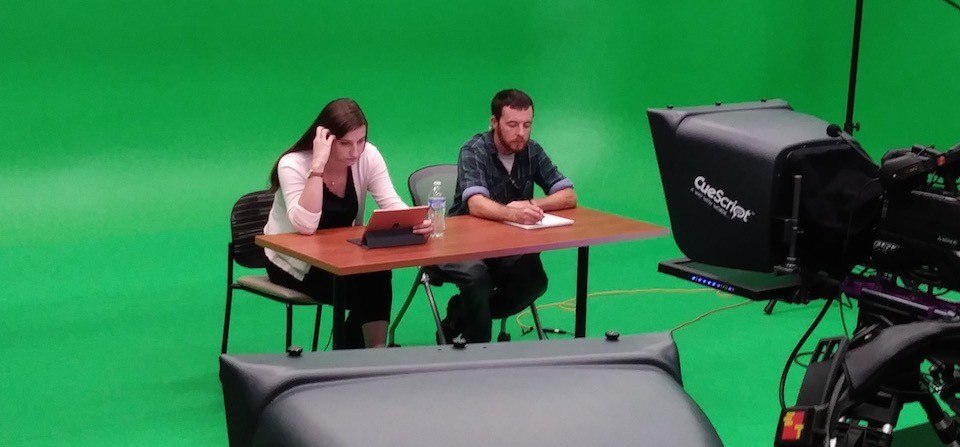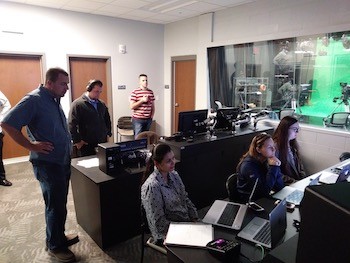Criminal Justice, School of Communication graduate students create podcast

Criminal Justice graduate students prepare to conduct an interview for the “Policy and Just(Us)” podcast.
Podcasting allows you to dive a little deeper into subjects while at the same time make it appeal to a broad audience.
In a unique collaboration, ‘Shawn Smith, assistant professor of criminal justice, and West Bowers, associate professor of media studies, presented the opportunity to graduate students to produce and create a three-episode podcast series focusing on policy and justice in the United States.
Each episode of “Policy and Just(Us)” focused on emerging criminal justice policy considerations. Each episode features a different subject matter expert and thought-provoking exchanges between the graduate students and subject matter experts.
“Policy and Just(Us),” was born out of the academic departments and schools of the College of Humanities and Behavioral Sciences (CHBS) that exist in close proximity. The 15-minute podcast follows the format of music, an introduction to the topic, an interview with a subject matter expert and open-ended discussion to finish the 15-minute episodes.
Smith said that criminal justice students were involved on the content side of the podcast.
“Their main responsibility was to, within the structure of the course, come up with the questions and the overall direction of the interviews of the three subject matter experts,” he said. “They also did the background research and provided the material around which a podcast could be built.”
Bowers discusses podcast editing
The subject matter experts
The first interviewee was Rod Graham, an assistant professor of sociology and criminal justice at Old Dominion University. He focused on cybercrime during his interview.
“Graham’s specialty is the sociological perspective on 21st century technology – specifically how it raises or lowers our sensitivity to certain vulnerabilities,” Smith said. “It exposes us to certain things about who we are as people. People could actually walk into traffic while on their phone. That concept only exists because of the technology is so powerful now that we could be video chatting with someone on the phone and the stream won’t break – it’s a continuous feed.”

The second subject matter expert was David Harris, professor of law at the University of Pittsburgh. Harris, who has his own podcast called “Criminal (In)Justice,” discussed the impact of big data and automation in criminal justice proceedings during his appearance on “Policy and Just(Us).”
George Joseph, currently working at Demos with an Emerging Voices Journalism Fellowship and a former freelance reporter for the Guardian U.S., was featured on the final podcast discussion the use of stingray technology by police departments, which has the ability to monitor cellular communications from various devices.
The final touches
After recording the interviews – which was done in the CHBS TV studio – the School of Communication (COMS) graduate students got to work.
“The heavy lifting on their end came after they had the full recordings, when they had to figure out how to piece the audio segments together, and go through and cut vocal pauses, actual pauses and other editing in the audio,” Bowers said. “They also had to find music that was appropriate and participate in the conversation in being the average listener. We didn’t want the podcast to just appeal to the criminal justice community. We wanted it to be something that appeals to the average person.”
The end result were three podcast episodes that dove into topics that – according to both Bowers and Smith – are not going away.